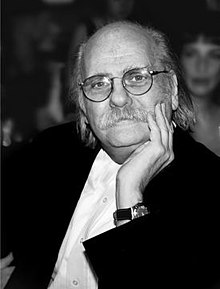Fred Newman (philosopher)
|
Fred Newman Ph.D. |
|
|---|---|
 |
|
| Born |
Fredrick Delano Newman June 17, 1935 Bronx |
| Died |
July 3, 2011 (aged 76) Manhattan |
| Education |
|
| Era | 19th and 20th century philosophy |
| Region | Western Philosophy |
| School | Post Modern Marxism |
|
Main interests
|
|
|
Notable ideas
|
|
|
Influenced
|
|
Frederick Delano "Fred" Newman (June 17, 1935 – July 3, 2011) was an American philosopher, psychotherapist, playwright and political activist, and creator of a therapeutic modality called Social Therapy.
Born in 1935 in New York City's Bronx County, Newman grew up in a working-class neighborhood. He served in the Army, including a stint in Korea. Later he attended the City College of New York under the G.I. Bill. He earned a Ph.D. in analytic philosophy and foundations of mathematics from Stanford University in 1962. Following his graduate work at Stanford, Newman taught at several colleges and universities in the 1960s, including the City College of New York, Knox College, Case Western Reserve University, and Antioch College.
During the 1960s and 1970s, there were diverse challenges to authoritarian and repressive social and political institutions. The institutions of psychiatry and psychotherapy, in particular, were the targets of passionate critiques by R.D. Laing and Thomas Szasz, among others. There were significant challenges to the class, racial, patriarchal, and homophobic biases in psychoanalysis and in Freudian and neo-Freudian therapies. There were also attempts to synthesize Marx and Freud.
The Practice of Method, written during this turbulent period, is the seminal written work on social therapy, the first published formulation by Newman and his colleagues of a Marxist approach to therapy. Social therapy came, in later years, to be influenced by other thinkers (notably Vygotsky and Wittgenstein) and other therapeutic approaches (notably cognitive behavioral therapy). The Practice of Method continues to be relevant, both because of its relationship to the ongoing practice of social therapy itself, and because it is the beginning of a continuing investigation of method in the study of human growth and development, to which Newman (together with his chief collaborator, Lois Holzman) returns again and again in later works.
In The Practice of Method, the title itself is the first provocation in a book that is full of them. A method is conventionally understood as something which is applied to (practiced on) appropriate objects. The practice of method is propounded as a new conception of method – not a method to be practiced, but a method that is a practice.
...
Wikipedia
